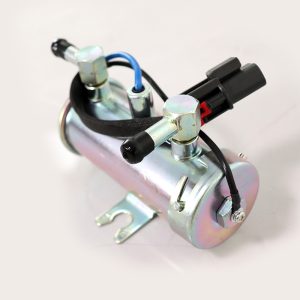A fuel pump is an essential component in a vehicle’s fuel system, responsible for delivering the necessary amount of fuel from the fuel tank to the engine. There are two main types of fuel pumps: mechanical fuel pumps and electric fuel pumps. In this article, we will explore the differences between these two types and their respective advantages and disadvantages.
Mechanical Fuel Pump
A mechanical fuel pump, as the name suggests, is powered by the engine’s mechanical motion. It typically consists of a diaphragm or a piston that moves back and forth, creating pressure to draw fuel from the tank and push it towards the engine. Here are some key characteristics of mechanical fuel pumps:
a) Simplicity: Mechanical fuel pumps are relatively simple in design, consisting of fewer components compared to electric fuel pumps. This simplicity often translates into lower manufacturing costs.
b) Reliability: Mechanical fuel pumps have a long history of reliable performance. They are less prone to electrical failures and can continue supplying fuel even in the event of an electrical system malfunction.
c) Lower Pressure: Mechanical fuel pumps tend to deliver fuel at a lower pressure compared to electric fuel pumps. This lower pressure is generally sufficient for carbureted engines, which rely on a precise mixture of air and fuel.
d) Engine Driven: Since mechanical fuel pumps derive their power directly from the engine, they require a mechanical connection (usually a camshaft) to operate. This dependency on engine rotation can limit their performance at low speeds and idle conditions.
Electric Fuel Pump
Electric fuel pumps, on the other hand, are powered by an electrical motor. They are commonly found in modern vehicles and offer several advantages over mechanical fuel pumps. Let’s examine their characteristics:
a) Higher Pressure: Electric fuel pumps are capable of delivering fuel at higher pressures, which is essential for fuel injection systems. Fuel injectors require a more pressurized fuel supply to ensure proper atomization and combustion.
b) Enhanced Control: Electric fuel pumps can be controlled electronically, allowing for more precise regulation of fuel flow and pressure. This control contributes to better engine performance and fuel efficiency.
c) Versatility: Electric fuel pumps are available in various designs and configurations, making them adaptable to different vehicle types and fuel system requirements. They can be mounted inside the fuel tank (submersible pumps) or externally.
d) Quieter Operation: Compared to the mechanical counterparts, electric fuel pumps generally operate more quietly due to their isolated location inside the fuel tank.
e) Dependency on Electrical System: Electric fuel pumps rely on the vehicle’s electrical system for power. Although this is usually not a problem, a failure in the electrical system can result in a complete loss of fuel supply.
f) Cost and Complexity: Electric fuel pumps are generally more expensive to manufacture than mechanical fuel pumps due to their complex design and electronic components. They may also require additional safety features, such as pressure regulators and fuel level sensors.
In summary, the main difference between a fuel pump and an electric fuel pump lies in their power source and operational characteristics. Mechanical fuel pumps are simpler and mechanically driven by the engine but deliver lower pressure. Electric fuel pumps, being powered by electrical motors, offer higher pressure, enhanced control, and greater design flexibility. Both types have their own advantages and considerations, which should be taken into account when selecting the appropriate fuel pump for a specific vehicle and fuel system requirements.



